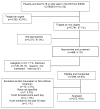Agreement between parents and youth on measures of anti-smoking socialization
- PMID: 20463847
- PMCID: PMC2867474
- DOI: 10.1080/10678281003635022
Agreement between parents and youth on measures of anti-smoking socialization
Abstract
BACKGROUND AND OBJECTIVES: Despite the current literature on the importance of parental anti-smoking socialization messages, it is unclear if youth and parents agree on the content and frequency of such messages. This study's purpose was to explore the level of agreement between parents and youth on measures of anti-smoking socialization and to assess whether agreement is associated with parental smoking status and/or parental race/ethnicity. METHODS: Data were collected from parent and 9-16 year old youth dyads who presented to the emergency department with a non-urgent complaint. A self-administered questionnaire assessing demographics and five antismoking socialization measures was used. RESULTS: Items that showed statistically significant agreement between parents and youth were frequency of explicit messages about smoking. However, the absolute agreement between the items was poor at less than 50% for the complete sample. Items that did not show statistically significant agreement between parents and youth were: maternal negative reaction to smoking (for all youth); specific rules about smoking and maternal negative reaction to smoking (for youth with parental smokers); and paternal negative reaction to smoking (for youth with parental nonsmokers). When pairs that did not agree were analyzed, there were significant discrepancies in youth-parent agreement by parental smoking status, but not by race/ethnicity. CONCLUSIONS: In this study, there was poor agreement between parents and youth on measures of anti-smoking socialization. Level of agreement was associated with parental smoking status, but not race/ethnicity. Since anti-smoking socialization is an important means to decrease youth tobacco initiation and use, future studies are needed to investigate the specific content, frequency, and format of parental anti-smoking messages that are best received and recalled by youth.
References
-
- Andersen MR, Leroux BG, Marek PM, Peterson AV, Jr, Kealey KA, Bricker J, et al. Mothers’ attitudes and concerns about their children smoking: do they influence kids? Preventive Medicine. 2002;34(2):198–206. - PubMed
-
- Andersen MR, Leroux BG, Bricker JB, Rajan KB, Peterson AV., Jr Antismoking parenting practices are associated with reduced rates of adolescent smoking. Archives of Pediatrics & Adolescent Medicine. 2004;158(4):348–52. - PubMed
-
- Aquilino WS, Supple AJ. Long-term effects of parenting practices during adolescence on well-being outcomes in young adulthood. Journal of Family Issues. 2001;22(3):289–308.
-
- Ary D, Duncan T, Duncan S, Hops H. Adolescent problem behavior: The influence of parents and peers. Behavior Research and Therapy. 1999;37:217–230. - PubMed
-
- Aspy CB, Vesely SK, Oman RF, Rodone S, Marshall L, Fluhr J, McLeroy K. Youth-parent communication and youth sexual behavior: implications for physicians. Fam Med. 2006;38(7):500–4. - PubMed
Grants and funding
LinkOut - more resources
Full Text Sources

